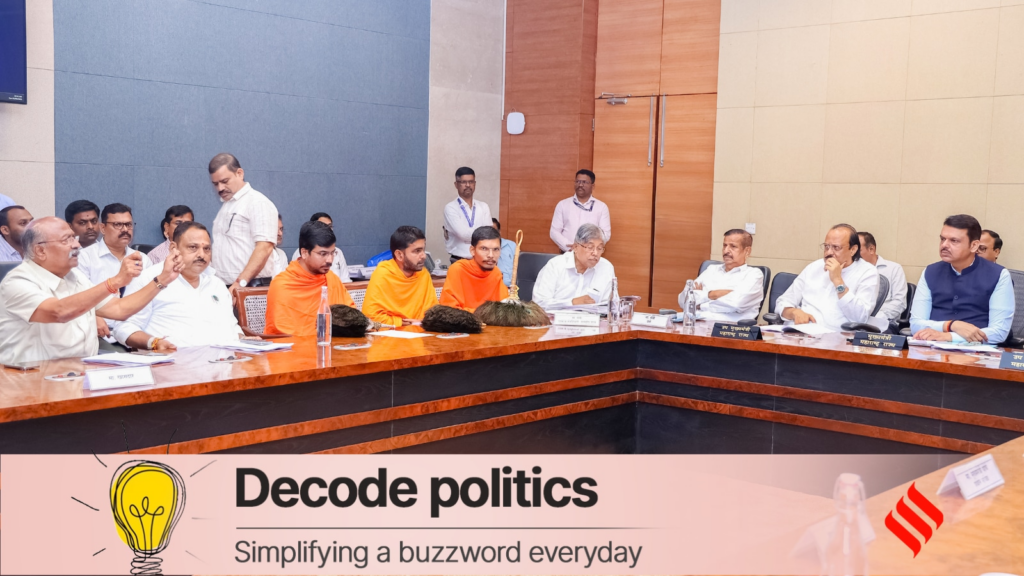In the past six months, tensions between the Jain community and the Maharashtra government have escalated sharply following a series of actions such as the demolition of a century-old temple, a crackdown on pigeon-feeding practices, and a court-ordered relocation of a temple elephant. Maharashtra, home to the largest Jain population in India, has seen frequent street protests in which the community has accused the administration of being insensitive to its religious traditions.
The BJP, long seen as a natural ally of Jains, has been actively engaged in damage control, clarifying that the actions stem from judicial orders, not anti-Jain sentiment.
How influential is the Jain community?
According to the 2011 Census, Maharashtra has 14 lakh Jains, accounting for 32% of Jains in the country, although they make up only 1.25% of the state’s population. Their strongest presence is in Mumbai (5.4%), Mumbai Suburban (3.7%), and Aurangabad (0.8%).
Despite their small size, Jains punch above their weight politically. The Maharashtra Assembly has seven MLAs from the community (2.43%), six of whom are from the BJP, with the seventh being part of the BJP-led alliance. The Jain-BJP alliance is seen as strategic, with the community historically offering the party both financial backing and electoral support.
Why are Jains unhappy?
The flashpoint came in April, when the Brihanmumbai Municipal Corporation (BMC) demolished parts of a Digambar Jain temple in Vile Parle, citing illegal construction. The action followed a city civil court order that denied the temple trust an extension of interim protection.
On April 19, thousands of Jains staged a silent protest march to the BMC’s K-East ward office in Andheri East, demanding accountability. The Maharashtra State Minority Commission, led by a BJP activist, condemned the demolition as “premature” and called for better consultation with the community.
Another point of friction was the government’s move to shut down kabutarkhanas or pigeon-feeding enclosures that hold spiritual significance for Jains as a symbol of “jeev daya (compassion for all life)”.
On July 3, during a Legislative Council session, minister Uday Samant announced the closure of 51 kabutarkhanas in Mumbai, citing public health concerns. The BMC followed with a citywide enforcement drive, fining individuals and shutting down enclosures.
The Bombay High Court on July 31 directed FIRs to be filed against those “illegally” feeding pigeons despite the ban. On August 2, all kabutarkahanas, including a famous one in Dadar, were sealed with grey tarpaulin, marking a symbolic loss for the community.
In another case that sparked protests from the community, a 36-year-old elephant named Mahadevi, housed at the Jain Math in the village Nandani in Kolhapur for over 30 years, was relocated to the Vantara Elephant Sanctuary in Gujarat by court order.
The decision was based on a High-Powered Committee report that, following a PETA complaint, found Mahadevi to be in poor health. After the Supreme Court upheld the order on July 28, protests erupted in Nandani and Kolhapur, with thousands marching to the Collectorate demanding her return, citing religious and emotional ties.
How has the BJP responded?
Fully aware of the community’s growing frustrations, the BJP has been working to calm the storm. After the temple demolition, BJP leaders joined protests and solidarity marches. BJP leaders such as minister Mangal Prabhat Lodha, MLA Parag Alavani, and corporator Murji Patel took part in the protests. The Maharashtra State Minority Commission, headed by BJP activist Pyare Khan, even called the demolition “criminal”.
In response to outrage over the pigeon-feeding ban, Lodha wrote to the BMC, urging a humane, regulated solution.
Chief Minister Devendra Fadnavis on Tuesday held a meeting where he spoke against the immediate closure of the kabutarkhanas and expressed the possibility of formulating rules on a specific time to feed the pigeons. Taking note of the public sentiment surrounding the elephant in Kolhapur, Fadnavis said his administration would file a review petition in the Supreme Court to bring it back.
“It is a fact that the community is angry. We have historically been aligned with the BJP and it is but natural that the community will feel that it is getting the rough end of the stick. While we do defend the BJP as its office-bearers, we do sense that there is hostility at least for now against the party,” said a middle-level BJP functionary from the community.
However, on both the temple demolition and the pigeon-feeding ban, BJP officials have pointed to court directives, suggesting the government was simply following judicial orders and not targeting Jain traditions.
“The actions of the government do not stem from any hostility of the BJP towards the Jain community. All these instances have taken place due to court orders. The government stands firmly with the community and, hopefully, an amicable solution will be found,” said BJP Jain Cell’s president Sandeep Bhandari.

